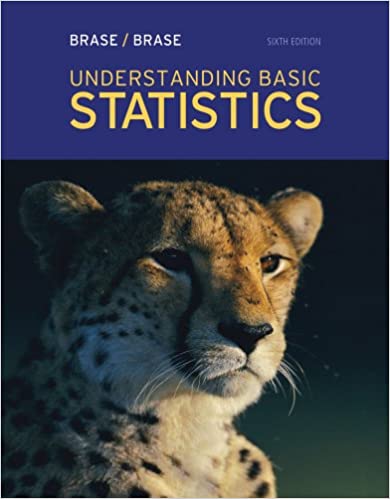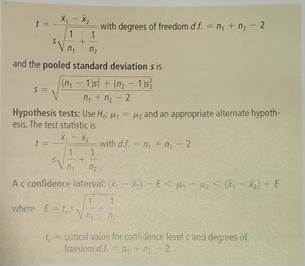
Understanding Basic Statistics 6th Edition by Charles Henry Brase,Corrinne Pellillo Brase
Edition 6ISBN: 978-1111827021
Understanding Basic Statistics 6th Edition by Charles Henry Brase,Corrinne Pellillo Brase
Edition 6ISBN: 978-1111827021 Exercise 38
Expand Your Knowledge: Pooled Two-Sample Procedure Consider independent random samples from two populations that are normal or approximately normal, or the case in which both sample sizes are at least 30. Then, if 1 and 2 are unknown but we have reason to believe that 1 = 2 , we can pool the standard deviations. Using sample sizes n 1 and n 2 , the sample test statistic
 has a Student's t distribution, where
has a Student's t distribution, where

Note: With statistical software, select the pooled variance or equal variance options.
There are many situations in which we want to compare means from populations having standard deviations that are equal. This method applies even if the standard deviations are known to be only approximately equal. Consider Problem 19 regarding average incidence of fox rabies in two regions. For region I, n 1 = 16,
 , and s 1 2.82, and for region II, n 2 = 15,
, and s 1 2.82, and for region II, n 2 = 15,
 , and s 2 2.43. The two sample standard deviations are sufficiently close that we can assume 1 = 2.
, and s 2 2.43. The two sample standard deviations are sufficiently close that we can assume 1 = 2.
(a) Use the method of pooled standard deviation to redo Problem 19(a).
(b) Use the method of pooled standard deviation to redo Problem 19(b).
 has a Student's t distribution, where
has a Student's t distribution, where
Note: With statistical software, select the pooled variance or equal variance options.
There are many situations in which we want to compare means from populations having standard deviations that are equal. This method applies even if the standard deviations are known to be only approximately equal. Consider Problem 19 regarding average incidence of fox rabies in two regions. For region I, n 1 = 16,
 , and s 1 2.82, and for region II, n 2 = 15,
, and s 1 2.82, and for region II, n 2 = 15,  , and s 2 2.43. The two sample standard deviations are sufficiently close that we can assume 1 = 2.
, and s 2 2.43. The two sample standard deviations are sufficiently close that we can assume 1 = 2.(a) Use the method of pooled standard deviation to redo Problem 19(a).
(b) Use the method of pooled standard deviation to redo Problem 19(b).
Explanation
(a)
Let
and
be the means of the di...
Understanding Basic Statistics 6th Edition by Charles Henry Brase,Corrinne Pellillo Brase
Why don’t you like this exercise?
Other Minimum 8 character and maximum 255 character
Character 255


